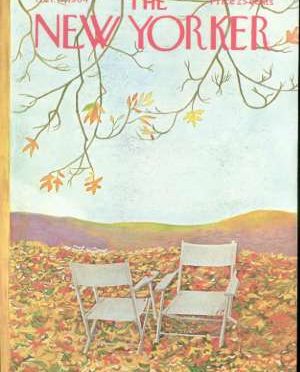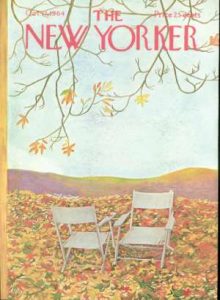I randomly bumped into this searching for something else. I’m not sure whether to laugh or take (mild) offense at this. Maybe we should revive this ancient game…?
This originally appeared in L’Apres-Midi d’un Fan by Roger Angell in the October 17, 1964 issue of The New Yorker. An archive of the issue can be found here.
Spike Ammidown: Wow, Tex! Thanks for that great on-the-spot coverage. Now, before we go to Red Glebman at the World Series — relax, Red, for crying out loud! It’s just a game — we want to bring you a fascinating feature story that I taped in person last week at the village of Izquirra, high in the Basque country of northern Spain, as an exclusive for the “Sunday Sports Shebang.” So, without more ado, we’ll roll that for you. Over to me, in Izquirra! . . . Good afternoon, folks! It’s I, Spike Ammidown, here in the main street of Izquirra, a mighty long way from Pawtucket, from where I’ll be showing you this from next Sunday. Such is the wonder of our shrinking, sports-loving globe! Today I’m going to bring you, exclusive and for the first time on any network, the annual championship game of Qub, the national Basque sport that is played only here in Izquirra. As you can see, I am surrounded by the villagers, who are garbing themselves with their interesting equipment and planning team strategy just before the whistle that will start this exciting eight-hour contest. Standing beside me is Raimondo Uzeuden, the Mayor of Izquirra and the only inhabitant who speaks English, who will explain to us some of the fine points of Qub. Tell us, Mayor Uzeuden, how many players are there on a side in Qub?
Mayor Uzcuden: Eet depends.
Spike Ammidown: I see. And these tall wicker baskets the players are strapping to their heads — what are they called?
Mayor Uzcuden: Zhey have no name. Just old baskets.
Spike Ammidown: Yes. Now, as I understand it, the players catch the ball, or qub, in these head-baskets and then dribble or pass the qub to their teammates at top speed. And the players must keep their hands in their pockets at all times. Is that correct?
Mayor Uzcuden: Ees correct.
Spike Ammidown: And what is the ball, or qub, made of?
Mayor Uzcuden: Sometimes ees a stone. Sometimes ees ball of feathers. This year, ees a Coke bottle.
Spike Ammidown: Golly! And how are the two goals demarcated?
Mayor Uzcuden: Uphill goal ees Don Federico’s donkey. Downhill goal ees bodega window. Goalie pays eef window gets broken. Keeps heem on toes, no?
Spike Ammidown: Thank you, Mayor! Gracias, amigo! And there you have it, Qub fans — the ancient rules of this ancient game! We’ll be back a little later with some great action scenes of this dangerous and lightning-fast sport, but first here’s another message from our sponsor.
Spike Ammidown: Here we are, sports lovers, back in the good old U.S.A. and live at the Pawtucket Golf- A-Way, all ready with more of your “Sunday Sports Shebang.” A few moments ago, we brought you a taped view of some of the complexities of that dangerous Basque game of Qub. Now we know you’re ready for simpler, more familiar fare — a game that you all know and love. In short, it’s pro football time! Buddy Pitts and his crew are perched high above the fifty-yard line at Memorial Stadium in Ottumwa, Iowa, where the second quarter of the game between the Ottumwa Chiefs and the Hannibal Elephants is in progress. Right after this live report, we’ll get back to Red Glebman and the World Series in St. Louis. So take it, Buddy Pitts!
Discover more from Buber's Basque Page
Subscribe to get the latest posts sent to your email.




Ha! I would love to see this recreated in person at a Basque picnic!